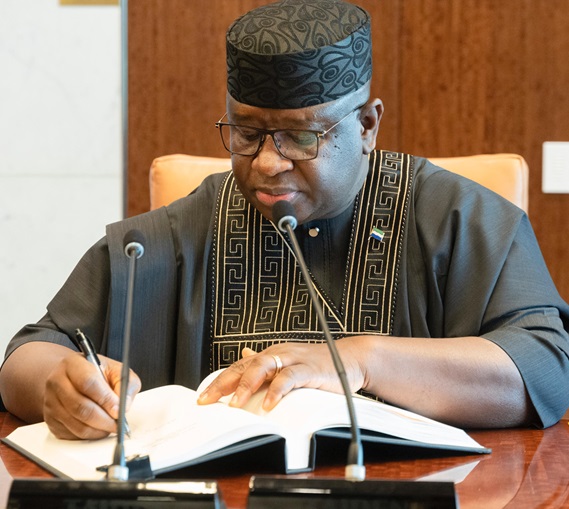After six years of what many call a misrule by the current government, the question most frequently asked is whether President Julius Maada Bio is laundering his image locally and internationally for a turnaround.
Bio’s rule is characterized by drug trafficking, human rights abuses and bad governance prompting image laundering moves to once more strengthen international relations. The arrest and declaration of a persona non grata by the Guinean authorities against Sierra Leone’s former Ambassador to Guinea, Alimamy Hassan Bangura and the recent police raid on Admire Bio’s residence means drugs enter the country by the help of those very close to the presidency.
It is the hope of many Sierra Leoneans that it is only image laundering that can ease Sierra Leone’s multi-faceted problems.
According to credible reports, government is considering an option to hand over to the Netherlands government Europe’s most wanted drug baron, Jos Leijdekkers also known as Bolle Jos, and locally called Umar Sheriff.
The notorious drug trafficker was recently convicted of drug trafficking in a Dutch court and sentenced to 24 years in absentia.
He was also slammed with similar sentence by Belgian judicial authorities.
According to credible sources, Leijdekkers have been hiding in Sierra Leone for months and request by Netherlands authorities to turn in the wanted criminal has been rejected outright by the Sierra Leone government citing state sovereignty as enshrined in the Vienna Convention.
Sierra Leone government also called for swap of fugitives naming Abdul Will Kamara aka Adebayor who was declared wanted for allegedly inciting violent protest and unrest in the country.
Sierra Leonean authorities have initially vowed that they will surrender Bolle Jos only if Adebayor is extradited to Sierra Leone for trial signalling a diplomatic row between the country and Netherlands.
It was at the height of the conflict between the two countries that the United States imposed a travel ban/visa restrictions on Sierra Leone as government’s resistance to the Dutch extradition request means that they bear a hand in the drug trade.
According to the ban, no government official should step into the United States until it is lifted.
Since the ban will adversely affect the country in such a crucial moment for Sierra Leone, the only way out is to see that Dutch drug baron is sent home.
However, the latest twist in government’s decision to hand over the drug baron means Sierra Leonean authorities are ready to play second fiddle to the Dutch government by extraditing the drug baron to end the controversy and once more get the favour of the international community.
Sierra Leone, quite lately, was branded a narco-state: a transit, landing place and springboard for drug traffickers whose criminal actions, according to reports, are aided and abetted by top government officials especially when Jos was spotted in Tihun, Sogbeni Chiefdom, in Bonthe, the hometown of the President attending a church service.
It is in Sierra Leone that dozens of youth were buried in a Mass gravesite in the west of Sierra Leone’s capital, Freetown owing to drug intake particularly the synthetic drug, ‘Kush’ whose main ingredient is human bones dug from cemeteries forcing government to beef up security at such places and police day-and-night patrols carried out to stop the youth from extracting corpses from graves.
Cocaine, opium and Cannabis among others also have their death toll and mental health problems among Sierra Leonean youth.
Others also battle it out with swollen limbs and feet with sores on their bodies, a situation that calls for action by government.
Apart from coming out of the illegal drug industry, President Bio also faces the big challenge of image laundering from human rights abuses committed under his watch.
It was under Bio’s rule that some bad apples in the forces of law and order saw might as right as killings were reportedly carried out in different parts of the country mainly in opposition strongholds.
The first fatal shoot out in 2018 which left one casualty was carried out in Rosengbe, a small village at Mile-91 owing to what government called a raid for Cannabis.
In July, 2020, another killing occurred in the Northern capital of Makeni involving six youth who protested against the relocation of a standby generator to Lungi which hosts the country’s only international airport.
The Pademba Road prison massacre involving dozens of inmates was also carried out in similar style.
It is also the same for the Iron Ore mining town of Lunsar in Port Loko district where scores of youth crumbled under the barrel of the gun while protesting for economic hardship. Almost invariably, 26 fatalities were also recorded on the civilian side and six on the police in August, 2022 for also protesting against hard times.
The youth in Tombo in the Western Area, Tonko Limba, Kambia district were all scenes of killings in the first term of President Bio.
Bad governance evidenced by corruption and unlawful dismissals in public institutions of those perceived as APC (All People’s Congress) supporters and sympathizers. Such dismissals also took place under Bio’s tenure.
Mass sackings were also seen at State House, the seat of power and the legislative house, Parliament, Statistics Sierra Leone, Office of Diaspora Affairs and the Sierra Leone Maritime Administration.
As the highest authority in the land, President Bio should have stopped such killings and sackings to unify the country. But, it is only now that government is taking steps to protect people’s rights, liberties and freedoms and to bring in more Northerners in state governance.
But, the recent sacking of the Youth Minister, Mohamed Orman Bangura and others said to have hailed from the Northern region has raised another eyebrows rendering President Bio’s image laundering meaningless.


